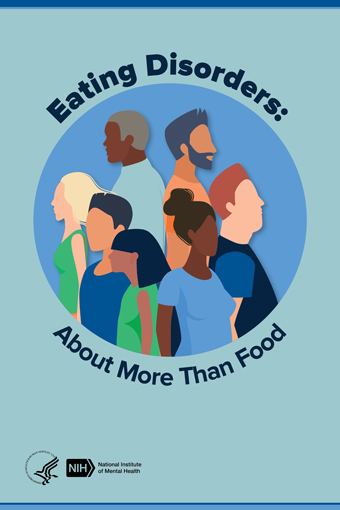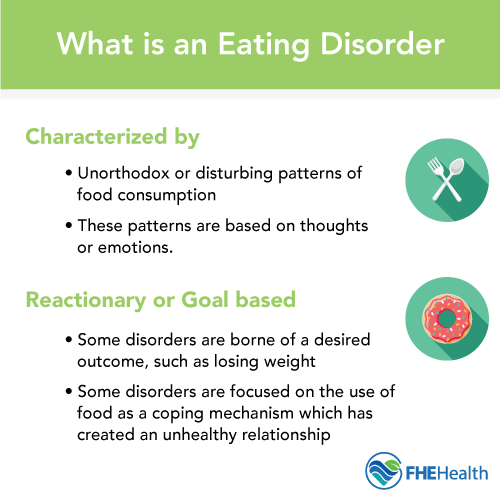The Ultimate Guide To Eating Disorder Recovery
Wiki Article
Unknown Facts About Eating Disorder Recovery
Table of ContentsThe smart Trick of Eating Disorder Recovery That Nobody is Talking AboutNot known Facts About Eating Disorder RecoveryThe Best Guide To Eating Disorder RecoveryMore About Eating Disorder RecoverySome Of Eating Disorder Recovery

Orthorexia is a kind of consuming disorder, still unrecognized in the DSM, wherein an individual comes to be consumed with "healthy consuming." While several people make a point to be mindful of the active ingredients and also sourcing of their food, orthorexia can end up being harmful to the individual's health and wellness. Orthorexia triggers people to identify details food or food teams as "correct," "healthy and balanced," or "pure." At some point, particular foods or whole groups are eliminated from the individual's diet regimen; they may additionally begin to stress over the components in their foods, spending hrs each day preparation meals (eating disorder recovery).
Food components might likewise come to be the person's just subject of discussion. Health effects might consist of a selection of intestinal and also nutritional discrepancies. It can additionally cause a number of the very same health and wellness threats as anorexia nervosa, as the person's calorie consumption may be seriously limited. Orthorexia is additionally a common co-occurring problem connected with OCD.
The Eating Disorder Recovery PDFs
With this problem, an individual will purely avoid certain foods to the detriment of their health - eating disorder recovery. Unlike orthorexia, nonetheless, the avoidance of certain foods isn't driven by notions of the food's healthfulness or pureness, yet instead by a serious aversion to the food's taste, appearance, or smell (although worries regarding wasting or gastrointestinal disorder might likewise be present).Over time, an increasing number of foods end up being illogical, leading to an extremely limited combination of acceptable foods. Formerly known as careful eating problem, ARFID usually begins in childhood as well as gradually aggravates in time. It's relatively usual for children to be "picky eaters" and also everybody has choices wherefore they eat, yet if it ends up being uncontrollable and also detrimental to an individual's wellness, it calls for a check-in with an eating condition therapy expert.
Additionally like orthorexia, an unfavorable or distorted body picture is not always a reason for the problem. ARFID is usually treated utilizing talk treatment as well as cognitive retraining such as Cognitive Behavior Therapy (CBT). Unlike the majority of eating conditions which typically first existing during adolescence, rumination problem is most common in infancy and also very early childhood, although it can linger right into their adult years.
The Greatest Guide To Eating Disorder Recovery
Typically, they do not experience stress and anxiety or disgust when regurgitating, nor do they show up to make an initiative to throw up (as seen in bulimia nervosa). Rumination condition is usually a reaction to an irrational fear of disease brought on by consuming, although its reasons are less well-understood than other eating problems.

Orthorexia is a kind of consuming condition, still unknown in the DSM, in which an individual ends up being consumed with "healthy eating." While many individuals emphasize to be aware of the ingredients and sourcing of their food, orthorexia can end up being harmful to the person's health. Orthorexia creates individuals to determine particular food or food groups as "appropriate," "healthy and balanced," or "pure." At some point, particular home foods or whole teams are gotten rid of from the individual's diet regimen; they might also begin to stress over the components in their foods, spending hrs daily planning meals.
The Eating Disorder Recovery PDFs

With this disorder, an individual will purely avoid particular foods to the detriment of their wellness. Unlike orthorexia, however, the evasion of certain foods isn't driven by concepts of the food's healthiness or purity, but instead by a severe aversion to the food's taste, texture, or smell (although issues regarding putridity or food poisoning may additionally be present).
In time, a growing number of foods end up being illogical, causing an incredibly restricted important source scheme of appropriate foods. Previously called careful eating condition, ARFID often starts in youth and also progressively worsens with time. It's reasonably common for kids to be "picky eaters" and every person has preferences wherefore they eat, however if it comes to be compulsive as well as damaging to an individual's wellness, it necessitates a check-in with an eating problem therapy professional.
Eating Disorder Recovery for Dummies
Like orthorexia, an adverse or altered body photo is not necessarily a cause of the condition. ARFID is typically dealt with using talk therapy and also cognitive retraining such as Cognitive Behavior Modification (CBT). Unlike a lot of eating conditions which normally initially present throughout adolescence, rumination problem is most typical in early stage as well as early childhood, although it can continue into the adult years.Usually, they do not experience anxiety or disgust when spitting up, neither do they appear to make an effort to throw up (as seen in bulimia nervosa). Rumination disorder is frequently a response to an illogical concern of disease triggered by eating, although its causes are much less well-understood than other eating conditions.
Rumination disorder is provided visit the website in the DSM-V. Diabulimia is listed as one of the numerous undefined consuming disorders under the catchall term OSFED (Various other Specified Feeding r Eating Condition).
Report this wiki page